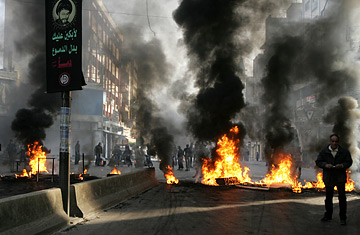
Burning tires block a street in Beirut's southern suburbs, January 23, 2007. Militants blocked roads across the country at the start of a one-day strike called by the opposition in its latest bid to topple the Western-backed government.
With government supporters urging all Lebanese to go to work as normal, the strike marks a critical test of the relative strength of the protagonists after nearly two months of political gridlock and worsening sectarian tensions.
Many Lebanese fear that the strike, which aims to cripple Beirut's airport and seaports and possibly block main roads, could spark violent street clashes. But a senior official from Hizballah insists that the strike will be peaceful, although effective.
"The strike is part of our peaceful protest against an illegitimate government," Sheikh Naim Qassem, the party's deputy leader, told TIME in an interview.
But he conceded that the strike alone is unlikely to bring down the administration, predicting a power struggle which could last months.
"What's certain, however, is that this government will not survive," the white-turbaned cleric says.
The Hizballah-led opposition launched its campaign on Dec. 1 with a massive rally in central Beirut and an open-ended sit-in which initially saw thousands of protestors camping out in car parks and squares ringed by Lebanese troops, coiled razor wire and armored vehicles. The opposition has demanded the creation of a national unity government followed by fresh parliamentary elections. But the number of protestors has dwindled in recent days as the campaign began showing signs of fatigue in the face of a government which has roughly equal public support, and seems determined not to buckle under pressure from the street.
The opposition says that the general strike heralds a new phase in the confrontation, and that further unspecified measures will be unveiled in the coming days.
The planned strike comes just two days ahead of a key international fundraising conference in Paris in which the Lebanese government hopes to raise billions of dollars to help revive the debt-laden economy and push through a program of economic reforms. Prime Minister Fouad Siniora has urged all Lebanese to go to work Tuesday as normal, and accused the opposition of attempting to sabotage the donor conference, known as Paris III.
"The Paris III conference is for all the Lebanese who want a better future for themselves and their children," he told reporters Monday.
Lebanon is still recovering from the ravages of last summer's 34-day war between Hizballah and Israel, which left over 1,000 Lebanese civilians dead and caused damage estimated at almost $4 billion. Hizballah's once heavily guarded and sealed-off headquarters in Beirut's southern suburbs was completely destroyed by multiple Israeli air strikes, and with its leaders still under the threat of assassination by Israel, security around them is tight. To reach Qassem, this reporter was driven by Hizballah security personnel into an unlit basement of a building then bundled into a minibus with blacked-out windows and driven around the southern suburbs for half an hour. Twice the minibus drove into a basement and waited to see it was being tailed before continuing to its destination.
"These are the new measures we all have to go through," says Qassem with a smile and a shrug. Despite the might of the Israeli military being unleashed upon Lebanon, Hizballah's disciplined and experienced guerrillas continued fighting right up to the Aug. 14 cease-fire, allowing the party leadership to declare a "divine victory" against the Jewish state. But the political battle between Hizballah and the Lebanese government began almost the moment the shooting war with Israel stopped.
In Lebanon, politics are rarely just local, but often mirror the tensions and influences of the broader Middle East. Supporters of the Lebanese government charge that Hizballah is an agent of Iran and Syria, pursuing a dangerous anti-Israel agenda at Lebanon's expense.
Qassem, however, accuses the government of being a cat's paw of the United States, seeking to marginalize Hizballah and allow Washington a Levantine toehold.
"Lebanon is being affected by the American agenda to control the region and create this new Middle East," he says.
The crisis has also aggravated tensions between Lebanese Sunnis and Shi'ites, itself a reflection of the regional intra-Muslim schism stirred by the chaos in Iraq and Sunni fears of Iran's Middle East ambitions. Last month, Qassem and a colleague traveled to Saudi Arabia to hold an unprecedented meeting with King Abdullah — Saudi Arabia is a key backer of the Lebanese government and known to harbor deep suspicions about Iranian objectives throughout the region.
"The Saudis have a big role in Lebanon and Hizballah is a major player in Lebanese politics, so there is an intention from both sides to enhance and strengthen our relations," Qassem says.
Indeed, many Lebanese believe that local politicians are incapable of resolving the crisis and that the remedy will come from the region's powerbrokers — Iran, Saudi Arabia and Syria — all of whom have vested interests in this tiny Mediterranean country.
Qassem insists that Iran is a neutral actor in the crisis, saying it is the U.S. that is partisan in openly backing the government against Hizballah.
"Our effort is to make sure that Lebanon is no longer a chessboard in an international game," he says.
But past Lebanese history suggests that, in fact, the country is once again in the grip of an untenable stalemate.
